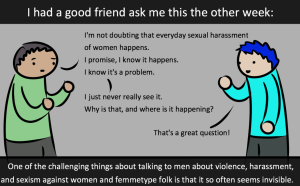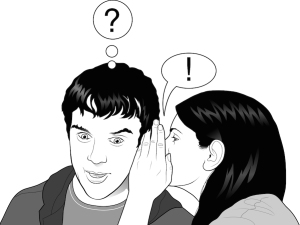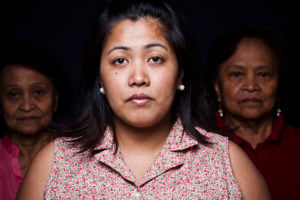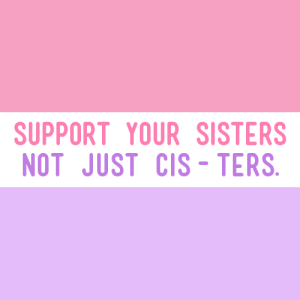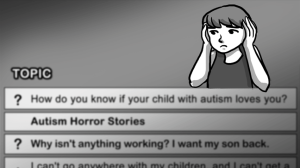Meeting new people can be hard. For some people, anxiety or shyness may be the reason why. For me, it’s because I don’t know whether I should tell them my pronouns or not.
You see, my pronouns are they/theirs. You might have met other people who use those pronouns. There are many different reasons why someone uses those pronouns. I use them because I’m genderfluid, so I don’t feel comfortable with either he/his or she/hers.
However, I often decide not to tell people what my pronouns are, especially if they’re cisgender (cis) – meaning they identify with the gender they were assigned at birth.
Why? Well, cis people can react pretty negatively when asked to use pronouns that they don’t think “fit” the person.
They get uncomfortable, upset, or sometimes even angry. Their reactions are hurtful. I knew someone who asked why people who use they/theirs don’t just use “it” instead. The statement wasn’t directed at me, but it was still dehumanizing and upsetting.
If you don’t understand the point of using the correct pronouns or get upset having to think about them, it’s probably because of your cis privilege.
It’s not because trans and non-binary people are making things up, or because gender theory is a whole bunch of crock.
It’s because you’re being forced to confront something that’s out of your comfort zone.
In all honesty, getting someone’s pronouns right is pretty easy. All you have to do is agree to use them!
So if you’re still uncomfortable with pronouns, here are six reasons why that’s a sign of your cis privilege.
1. You Haven’t Considered That Trans and Non-Binary People Exist
It doesn’t mean that you literally don’t know that trans and non-binary people exist (unless you don’t, in which case here are some resources).
It means that you don’t have to think about the fact that our lives and experiences are different from yours.
Here’s a parallel that might help you understand: Because people misgender me as a woman, they sometimes ask me whether I have a boyfriend or assume that I’m only interested in men.
It’s not that these people don’t know that queer people exist. It’s just that they think queer people exist in some other dimension, or that they can’t be “normal” people that they might meet in their everyday lives.
In other words, they assume that everyone is straight.
When you get uncomfortable about pronouns, it’s because you assume that everyone is the gender they were assigned at birth and uses pronouns that “match” their gender presentation.
Basically, you assume that only people like you exist.
So when someone tells you that their pronouns are different, you’re forced to confront the fact that there are people who aren’t cisgender. And I’ll be honest: I don’t really understand why that makes people uncomfortable.
Maybe it’s because acknowledging trans and non-binary people means that your own identity as a cis person isn’t as solid as you once thought it was. Maybe it’s because like most people, you don’t like confronting unknown things.
Whatever the reason, being uncomfortable because you have to think about pronouns is a sign that you have cis privilege. After all, trans and non-binary people have to think about our pronouns all the time.
We have to think about whether we should tell people about our pronouns. We have to weigh the possible negative consequences of asking people to use our pronouns. We have to deal with the harmful effects of being misgendered.
And the reason why we have to think about these things is related to another privilege that you, as cis people, have.
2. You Can Take Your Pronouns (And Gender Identity) for Granted
If you’re cis, you’ve probably never had to question your gender identity. Your gender is the same as the one you were assigned at birth.
Which means, more importantly, that other people don’t question your gender.
People don’t tell you that you don’t “look” like a man or woman, or that they don’t “get” what it means to be agender. They don’t play 20 Questions with you by asking things like “When did you know you were a man?”
You’re secure in your gender because the people around you constantly validate and affirm it. That’s why you never have to think about what pronouns you use. It seems obvious to you.
Those of us who aren’t cis, on the other hand, don’t have that privilege. We have to deal with people misgendering us, not believing us, or even asking invasive questions about our bodies.
Getting misgendered might seem like a small thing, but for me, it’s tiring and disorienting. My sense of identity is eroded every time someone refers to me as “she” or calls me a girl.
Sometimes I forget that I’m not a woman because everyone keeps telling me that I am. It gets pretty difficult.
Maybe you think that things wouldn’t be as difficult if I didn’t identify as genderfluid. But how can I not? That’s my gender, whether you think it’s real or not (and it is, for the record).
It’s as real as your gender – it’s just that other people don’t acknowledge it the same way they do yours.
3. You Think You Can Dictate What Other People’s Genders Are
Privilege isn’t just about having advantages that someone else doesn’t, or even just about having those advantages at the cost of other people. It means feeling that you have the right to dictate how those people should think and feel.
You see this all the time with white people. They tell people of color that they’re too sensitive and are overreacting, or they tone police them by saying that they aren’t resisting racism nicely enough.
But what would white people know about racism and how to resist it?
They are, after all, the people benefitting the most from it! Yet their white privilege makes them feel as if they have the right to tell people of color how to feel and act.
It’s the same thing when you resist using trans and non-binary people’s pronouns, or challenge them about it.
You think that you know their own gender better than they do. There’s no way you could, but that’s what you believe because you’ve been told, over and over, that your views on gender are the correct ones.
Anyone who thinks otherwise is just delusional. And that’s a huge part of your cis privilege: that you can be affirmed in your beliefs by the larger world.
Trans and non-binary people, on the other hand, are constantly undermined. Our identities and views on gender are discounted, which is why people won’t believe us when we tell them about our pronouns – something you’d think we’d know best!
4. You Don’t Respect Trans and Non-Binary People’s Humanity
When you refuse to acknowledge someone’s pronouns, you aren’t seeing them as another human being. Plain and simple.
You’re telling them that you don’t believe their identity. In short, that you don’t think they really exist unless they conform to what you think is the status quo.
I know someone who said that he thought of they/their pronouns as a preference, and since he didn’t prefer it, he didn’t use it. On top of being just plain rude, it was an admittance that he didn’t care what a non-binary person might feel.
Basically, he was saying that since he didn’t understand why someone would use they/their pronouns, he could just dismiss it. End of story. There was no need to try and understand the other person’s point of view.
Privilege means thinking that you’re the status quo and everyone different isn’t deserving of respect or empathy. And that’s exactly what you’re doing when you dismiss people’s pronouns.
5. You Actively Work to Keep the Status Quo
Rejecting people’s pronouns means rejecting trans and non-binary people’s existence. And if they don’t exist, then the world can continue unchanged.
It might sound like a stretch, but it’s really not. When people quiz me about my pronouns or don’t like using them, I feel as if they’d rather pretend I don’t exist.
That way, they don’t have to question the things they’ve taken for granted. Their own existence can continue with comfort.
Which brings me to my final point…
6. You Consider Your Discomfort Greater Than Trans and Non-Binary People’s Discomfort
It might make you uncomfortable or upset to think about using people’s proper pronouns. You might hate worrying about whether you’ll get it wrong.
But consider what I talked about above: Being misgendered is a much more uncomfortable experience for trans and non-binary people.
If you’re only thinking about your discomfort, it’s a sign of your cis privilege. It means that you think your comfort should be catered to first.
In other words, you think your comfort is more important than trans and non-binary people’s.
This sort of ties in with the previous sections. As a cis person, it’s a privilege for you to think that cis people are the only people who exist. You don’t have to consider how other people’s experiences might be different.
As a cis person, it’s a privilege for you to take your pronouns (and gender identity) for granted, and to have other people constantly validate that.
And if you believe that only people like you exist, and on top of that, are constantly validated in this belief—well, it’s easy to think that trans and non-binary people who insist on using their pronouns are just making things up.
Except, you know, we’re not.
The discomfort and pain that we feel is valid. It doesn’t matter less than your own discomfort. In fact, I think it’s safe to say that it matters more.
What happens to you, ultimately, if you have to confront something outside of your comfort zone? Well, you might learn something new and grow as a person.
Trans and non-binary people, on the other hand, have to deal with trauma when their identity is questioned or when people get upset at them for requesting that their pronouns be used.
***
As one person in this Buzzfeed video says that people’s pronouns aren’t really “preferred.” They’re that person’s actual pronouns, the same way your pronouns are just your pronouns.
It’s important to use people’s correct pronouns because it’s the right thing to do. It signals that you see them as a person and that you respect their gender identity.
Whether you understand why someone uses the pronouns they do is another matter. Gender is diverse and complicated, and even non-binary and trans people don’t have it all figured out.
But you don’t have to understand why someone uses their pronouns in order to use them, too.
You can just accept that those are their pronouns. It’s as simple as that. And if that makes you uncomfortable—well, maybe it’s time to examine your privilege.
[do_widget id=’text-101′]
Kerry Truong is a Contributing Writer for Everyday Feminism. They are a queer diasporic Vietnamese womxn and graduated this spring with a double degree in English and Asian American Studies. When they’re not philosophizing about this at length, they’re reading, taking long walks, or cooing over all the dogs who cross their path. Read their Everyday Feminism articles here.
Search our 3000+ articles!
Read our articles about:
Our online racial justice training
Used by hundreds of universities, non-profits, and businesses.
Click to learn more
Most Read Articles
- « Previous
- 1
- …
- 30
- 31
- 32






